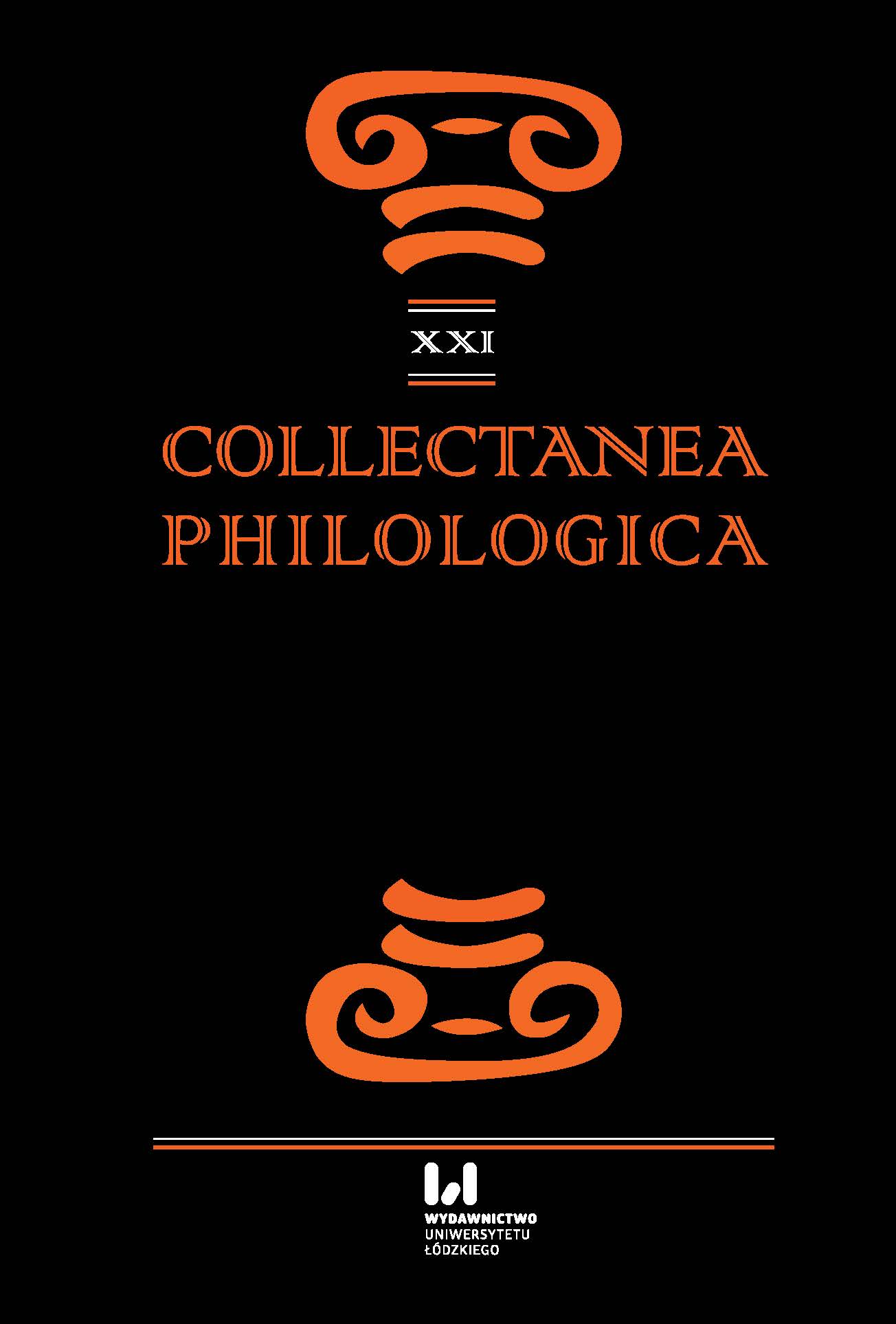Z badań nad pojęciem pamięci – mneme w dramacie greckim. Część II: Mneme w utworach Eurypidesa
DOI:
https://doi.org/10.18778/1733-0319.21.02Słowa kluczowe:
mneme – memory, semantics, ancient Greek tragedy, EuripidesAbstrakt
Study on the concept of mneme – “memory” in the plays of Euripides is a continuation of our research (based on the works of Greek tragedians), whose aim is not only to establish meanings, especially new ones, but also to define the role that this concept plays in the works of Euripides. Linguistic and literary analysis of 8 instances of a noun mneme shows that this concept reveals hitherto unknown semantic values and it also performs functions that are important for the plot. Among the meanings of mneme there are five new ones: (1) “testimony, proof” (Suppliant Women), whose role is a ‘media’ message to guarantee the preservation of memory about Theseus’ feats among descendants, (2) “account, balance” (Heracles), rational argument, which the hero must use in a critical situation caused by divine power, (3) specific “history”, which creates the plot (Ion), (4) “reason, rightness” (Iphigenia at Aulis), i.e. evidence of predominance of the woman over the man (in terms of character), (5) “image”, twice in this sense (Iphigenia at Aulis): 1. as a panorama, vivid memory of panegyric and cognitive nature (Greek expedition), 2. as scenes from Iphigenia’s childhood cited in order to change the decision of Agamemnon. In addition to the new ones, Euripides also uses known meanings: mneme with negation, i.e. the lack of “mentions, memories” (= concealment) becomes an important element of the plot of Helen, guaranteeing its happy ending; in turn mneme as Kreon’s “thought” is a tool for mastering feelings and influencing the development of stage events. All meanings defined by Euripides can be divided into two groups. The first group includes meanings that have rational value: (1) “account, balance”, (2) “thought”, (3) “reason, rightness”. In the other group there are expressive meanings: (1) “testimony, proof”, (2) “mention, memory”, (3) “history”, (4) “image”. Undoubtedly, Euripides not only broadened the semantic scope of the concept of mneme, introducing its new values, but creatively used them in his plays, whether to describe the main characters, or as an element influencing the action, or finally as a testimony of the past that is important for the plot.
Bibliografia
Chantraine, P. (1974). Dictionnaire étymologique de la langue grecque. Histoire des mots. T. III: Λ – Π. Paris: Éditions Klincksieck.
Google Scholar
Czerwińska, J. (2005). Eurypides i jego twórczość dramatyczna oraz mniejsi tragediopisarze, [w:] H. Podbielski (red.). Literatura Grecji starożytnej. T. I: Epika – liryka – dramat. Lublin: Towarzystwo Naukowe KUL, 771–876.
Google Scholar
Czerwińska, J. (2006). „Hercules furens – Eurypidejska przypowieść o ludzkim szaleństwie”. Collectanea Philologica, 9, 87–111.
Google Scholar
Euripides (1994). Phoenissae. Ed. with an introd. and comm. by D. J. Mastronarde. Cambridge Classical Texts and Commentaries. Cambridge: Cambridge University Press.
Google Scholar
Euripides (1998). Suppliant Women. Electra. Heracles. Ed. and transl. by D. Kovacs. Loeb Classical Library 9. Cambridge, MA: Harvard University Press.
Google Scholar
Euripides (1999). Trojan Women. Iphigenia among the Taurians. Ion. Ed. and transl. by D. Kovacs. Loeb Classical Library 10. Cambridge, MA: Harvard University Press.
Google Scholar
Euripides (2002). Helen. Phoenician Women. Orestes. Ed. and transl. by D. Kovacs. Loeb Classical Library 11. Cambridge, MA: Harvard University Press.
Google Scholar
Euripides (2003). Bacchae. Iphigenia at Aulis. Rhesus. Ed. and transl. by D. Kovacs. Loeb Classical Library 495. Cambridge, MA: Harvard University Press.
Google Scholar
Eurypides (2006). Tragedie. T. 2: Andromacha, Oszalały Herakles, Trojanki, Elektra, Ifigenia w kraju Taurów, Ijon. Przełożył, wstępami i przypisami opatrzył Jerzy Łanowski. Przekład przejrzała Janina Ławińska-Tyszkowska. Biblioteka Antyczna. Warszawa: Prószyński i S-ka.
Google Scholar
Eurypides (2007). Tragedie. T. 3: Helena, Fenicjanki, Orestes. Przełożył, wstępami i przypisami opatrzył Jerzy Łanowski. Przekład przejrzała Janina Ławińska-Tyszkowska. Biblioteka Antyczna. Warszawa: Prószyński i S-ka.
Google Scholar
Eurypides (2007a). Tragedie. T. 4: Bakchantki, Ifigenia w Aulidzie, Cyklop, Rhesos. Przełożył, wstępami i przypisami opatrzył Jerzy Łanowski. Przekład przejrzała Janina Ławińska-Tyszkowska. Biblioteka Antyczna. Warszawa: Prószyński i S-ka.
Google Scholar
Eurypides (2017). Tragedie. T. 1: Alkestis, Medea, Dzieci Heraklesa, Hipolit, Hekabe, Oszalały Herakles, Trojanki. Przełożył, wstępem i przypisami opatrzył Robert R. Chodkowski. Lublin: Towarzystwo Naukowe KUL.
Google Scholar
Komorowska, J. (2011). Fenicjanki. Studium tragedii Eurypidesa. Prace Komisji Filologii Klasycznej. Nr 42. Kraków: Polska Akademia Umiejętności.
Google Scholar
LSJ = Liddell, H.G., Scott, R., Jones, H.S., McKenzie R. (1996). A Greek-English Lexicon. A new ninth Edition revised and augmented by H. S. Jones. With the assistance of R. McKenzie. Supplement. Ed. by P.G.W. Glare. Oxford: Clarendon Press.
Google Scholar
Montanari, F. (ed.) (2015). The Brill Dictionary of Ancient Greek. Editors of the English Edition M. Goh & Ch. Schroeder. Under the auspices of the Center for Hellenic Sudies. Advisory Editors G. Nagy, L. Muellner. Leiden-Boston: Brill.
Google Scholar
Mueller-Goldingen, C. (1985). Untersuchungen zu den Phönissen des Euripides. Stuttgart: Steiner.
Google Scholar
Paley, F.A. (ed.) (1858). Euripides. With an English Commentary. Vol. 2. London: Cambridge University Press [digitally printed version 2010].
Google Scholar












